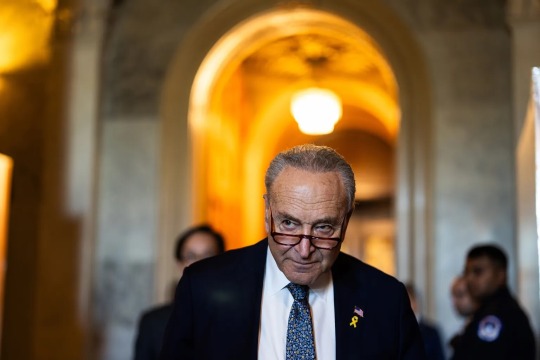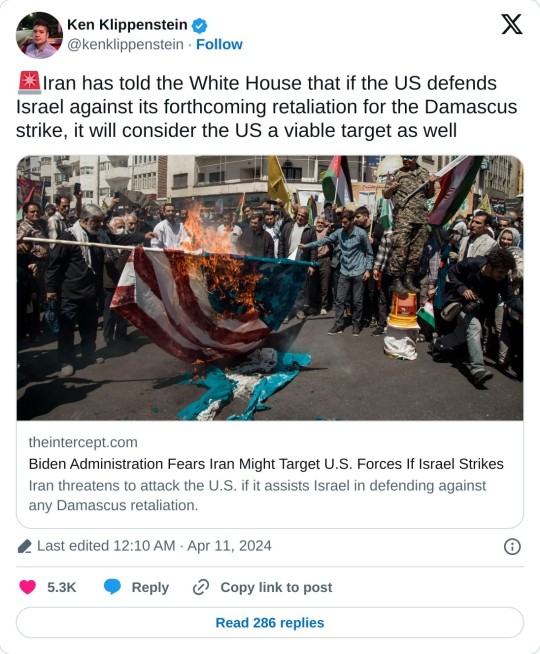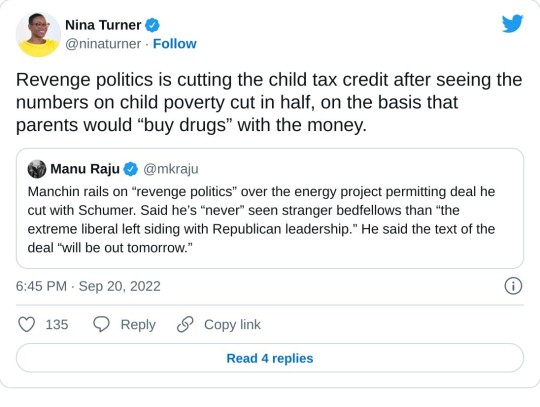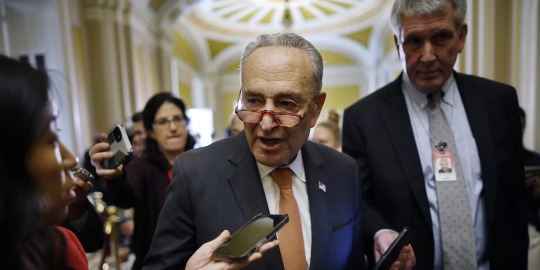#senate majority leader chuck schumer
Text
Arizona Sen. Kyrsten Sinema is leaving the Democratic Party and registering as a political independent, she told CNN’s Jake Tapper in an exclusive TV interview.
“I’ve registered as an Arizona independent. I know some people might be a little bit surprised by this, but actually, I think it makes a lot of sense,” Sinema said in a Thursday interview with Tapper in her Senate office.
“I’ve never fit neatly into any party box. I’ve never really tried. I don’t want to,” she added. “Removing myself from the partisan structure – not only is it true to who I am and how I operate, I also think it’ll provide a place of belonging for many folks across the state and the country, who also are tired of the partisanship.”
Sinema’s move away from the Democratic Party is unlikely to change the power balance in the next Senate. Democrats will have a narrow 51-49 majority that includes two independents who caucus with them: Sens. Bernie Sanders of Vermont and Angus King of Maine.
While Sanders and King formally caucus with Democrats, Sinema declined to explicitly say that she would do the same. She did note, however, that she expects to keep her committee assignments – a signal that she doesn’t plan to upend the Senate composition, since Senate Majority Leader Chuck Schumer controls committee rosters for Democrats.
“When I come to work each day, it’ll be the same,” Sinema said. “I’m going to still come to work and hopefully serve on the same committees I’ve been serving on and continue to work well with my colleagues at both political parties.”
But Sinema’s decision to become a political independent makes official what’s long been an independent streak for the Arizona Senator, who began her political career as a member of the Green Party before being elected as a Democrat to the US House in 2012 and US Senate in 2018. Sinema has prided herself on being a thorn in the side of Democratic leaders, and her new nonpartisan affiliation will further free her to embrace an against-the-grain status in the Senate, though it raises new questions about how she – and Senate Democrats – will approach her reelection in 2024 with liberals already mulling a challenge.
Sinema wrote an op-ed in the Arizona Republic released Friday explaining her decision, noting that her approach in the Senate has “upset partisans in both parties.”
“When politicians are more focused on denying the opposition party a victory than they are on improving Americans’ lives, the people who lose are everyday Americans,” Sinema wrote.
“That’s why I have joined the growing numbers of Arizonans who reject party politics by declaring my independence from the broken partisan system in Washington.”
Sinema is up for reelection in 2024 and liberals in Arizona are already floating potential challengers, including Arizona Rep. Ruben Gallego, who said earlier this year that some Democratic Senators have urged him to run against Sinema.
“Unfortunately, Senator Sinema is once again putting her own interests ahead of getting things done for Arizonans,” Gallego said in a statement following Sinema’s announcement.
Sinema declined to address questions about her reelection bid in the interview with Tapper, saying that simply isn’t her focus right now.
She also brushed aside criticism she may face for the decision to leave the Democratic Party.
“I’m just not worried about folks who may not like this approach,” Sinema said. “What I am worried about is continuing to do what’s right for my state. And there are folks who certainly don’t like my approach, we hear about it a lot. But the proof is in the pudding.”
MANY DEMOCRATS SHRUG OFF NEWS OF SINEMA’S ANNOUNCEMENT
White House press secretary Karine Jean-Pierre called Sinema a “key partner” following her decision and said the White House has “every reason to expect that we will continue to work successfully with her.”
Sources familiar with the matter tell CNN that Sinema gave the White House a heads up that she was leaving the Democratic Party. Schumer said in a statement he also was aware of Sinema’s bombshell announcement ahead of Friday morning.
“She asked me to keep her committee assignments and I agreed,” Schumer said. “Kyrsten is independent; that’s how she’s always been. I believe she’s a good and effective Senator and am looking forward to a productive session in the new Democratic majority Senate.”
Schumer also outlined how he did not expect Sinema’s decision to impact Democrats’ plans for next year, saying in his statement, “We will maintain our new majority on committees, exercise our subpoena power, and be able to clear nominees without discharge votes.”
The Biden White House is offering a muted reaction Friday morning and insisting that they expect to continue having a productive working relationship with the senator.
One White House official tells CNN that the move “doesn’t change much” other than Sinema’s own reelection calculations.
“We’ve worked with her effectively on a lot of major legislation from CHIPS to the bipartisan infrastructure law,” the official said. The White House, for now, has “every reason to expect that will continue,” they added.
Sinema has long been the source of a complex convergence of possibility, frustration and confusion inside the White House.
“Rubik’s cube, I guess?” was how one former senior White House official described the Arizona Senator who has played a central role in President Joe Biden’s largest legislative wins and also some of his biggest agenda disappointments.
There was no major push to get Sinema to change her mind, a White House official said, noting that it wouldn’t have made a difference.
“Nothing about the last two years indicates a major effort would’ve made helped – the exact opposite actually,” a White House official said.
The most urgent near-term effort was to quietly find out what it meant for their newly expanded Senate majority, officials said.
While there were still clear details to figure out about process, “I think people exhaled when we had a better understanding of what she meant,” one source familiar with the discussion said.
Democratic Sen. Amy Klobuchar of Minnesota told “CNN This Morning” that “Senator Sinema has always had an independent streak,” adding that “I don’t believe this is going to shake things up quite like everyone thinks.”
She added, “Senator Sinema has been an independent in all intents and purposes.”
‘IT’S OK IF SOME PEOPLE AREN’T COMFORTABLE WITH THAT APPROACH’
Sinema and West Virginia Democratic Sen. Joe Manchin have infuriated liberals at various points over the past two years, standing in the way of Biden’s agenda at a time when Democrats controlled the House, Senate and White House.
Sinema and Manchin used their sway in the current 50-50 Senate – where any single Democrat could derail a bill – to influence a host of legislation, especially the massive $3.5 trillion Build Back Better bill that Biden proposed last year. Sinema’s objections to increasing the corporate tax rate during the initial round of negotiations over the legislation last year particularly rankled liberals.
While Sinema was blindsided by the surprise deal that Manchin cut with Schumer in July on major health care and energy legislation, she ultimately backed the smaller spending package that Biden signed into law before the election.
Both Manchin and Sinema also opposed changes to the Senate’s filibuster rules despite pressure from their Senate colleagues and Biden to change them. After a vote against filibuster changes in January, the Arizona Democratic Party’s executive board censured Sinema.
Sinema has been in the middle of several significant bipartisan bills that were passed since Biden took office. She pointed to that record as evidence that her approach has been an effective one.
“I’ve been honored to lead historic efforts, from infrastructure, to gun violence prevention, to protecting religious liberty and helping LGBT families feel secure, to the CHIPs and science bill to the work we’ve done on veterans’ issues,” she told CNN. “The list is really long. And so I think that the results speak for themselves. It’s OK if some people aren’t comfortable with that approach.”
Sinema’s announcement comes just days after Democratic Sen. Raphael Warnock won reelection in Georgia, securing Democrats a 51st Senate seat that frees them from reliance on Vice President Kamala Harris’ tiebreaking vote.
Sinema declined to address questions about whether she would support Biden for president in 2024, and she also said she’s not thinking about whether a strong third party should emerge in the US.
#us politics#news#cnn#cnn politics#2022#us senate#sen. kyrsten sinema#independent#biden administration#Democrats#jake tapper#sen. chuck schumer#senate majority leader chuck schumer#sen. bernie sanders#sen. angus king#sen. joe manchin#the arizona republic#arizona#Karine Jean-Pierre
13 notes
·
View notes
Text
Outrage at Chuck Schumer’s Speech: The Pro-Israel Right Wants to Eat Its Cake Too
Neoconservatives Only Hate “Interference” in Israel When It Means Anything Other Than Blank-Check Support For Apartheid and Slaughtering Palestinians.
— Murtaza Hussain | March 15, 2024

Senate Majority Leader Chuck Schumer, a Democrat from New York, departs the Senate Chamber at the US Capitol in Washington, DC, US, on Thursday, March 14, 2024. Schumer called for Israel to hold new elections, a sharp break with Prime Minister Benjamin Netanyahu from the highest-ranking Jewish US elected official. Photographer: Tierney L. Cross/Bloomberg via Getty Images
On Thursday, Senate Majority Leader Chuck Schumer, D-N.Y., gave a speech that provoked anger from right-wing supporters of Israel, many who described it as a regime-change effort targeting Israeli leader Benjamin Netanyahu. The roughly 40-minute speech, delivered by Schumer on the floor of the Senate, attacked Hamas as well as critics of Israel, while vowing that the U.S. would defend and support Israel through any crises it faced. But Schumer also took direct aim at Netanyahu, describing his government as “an obstacle to peace” and saying that his coalition government “no longer fits the needs of Israel.”
Schumer went further in his remarks, calling for elections in Israel to bring a new government to power and saying that Netanyahu had “lost his way by allowing his political survival to take precedence over the best interests of Israel.”
Despite its otherwise pro-Israel tone, Schumer’s speech predictably triggered outrage among staunch pro-Israel Republicans, including many neoconservatives. Writing for the Council on Foreign Relations, Elliott Abrams, of Iran–Contra fame, hysterically accused Schumer of attempting to turn Israel into an “American colony” by intervening in its politics. “It’s a shameful and unprecedented way to treat an ally,” he wrote, “and an “unconscionable interference in the internal politics of another democracy.” His views were echoed by Israeli officials like former Prime Minister Naftali Bennett, who took to social media to denounce his comments as “external political intervention” in Israeli affairs.
These arguments could perhaps be respected were it not for the massive, regular, and institutionalized intervention in U.S. political life carried about by the Israeli government and its supporters, which has successfully turned the affairs of a small country on the eastern Mediterranean into one of the most important domestic political issues in America. Netanyahu himself has shown no embarrassment about his own intervention in American politics, delivering rapturous speeches lobbying the U.S. Congress to legislate in favor of Israel and essentially endorsing his favored political candidates for office during U.S. elections.
American foreign policy is today effectively handcuffed by the lobbying efforts of powerful special interest groups like the American Israel Public Affairs Committee. These organizations are hellbent on ensuring that the U.S. provide Israel unstinting military, economic, and diplomatic support, even as its government rebuffs repeated U.S. requests to allow the creation of a Palestinian state in accordance with international law.
The complaints of people like Abrams and Bennett that the U.S. is intervening in Israeli affairs seem utterly myopic at best, given that extensive U.S. intervention is not just welcomed but also demanded by Israel and its supporters so long as it is in accordance with the security and political needs of the Israeli government.
Now More Than Ever
Schumer’s speech comes at a moment in which Israel has perhaps never been more isolated, or more dependent on U.S. support. The U.S. today has pivoted back to the Middle East against its own wishes, fighting the Houthis on behalf of Israel, providing arms for Israel’s campaign in Gaza, and deterring Hezbollah in Lebanon by parking its aircraft carriers in the Mediterranean. When three American military service members were killed in Jordan earlier this year, the assailants were clear that their motive was retaliating against U.S. support of Israel.
The U.S. has used its veto powers at the United Nations to shield Israel from an onslaught of global outrage over the scenes of mass killing and starvation in Gaza. As Israel has faced diplomatic assaults from Brazil, South Africa, China, and across the Muslim world, the U.S. has remained steadfast as its most important and often only defender in international fora.
All this support has come with very little reciprocation from Israel. In the wake of President Joe Biden’s comments expressing rhetorical support for an eventual two-state solution, Netanyahu publicly humiliated his most important patron by publicly vowing that no Palestinian state would ever be created. The right-wing prime minister even bragged about his own historic role in preventing one from coming into existence.
Netanyahu’s steadfast commitment to defying international law and overwhelming global opinion to pursue a project of continued colonization of the West Bank is only made possible thanks to his and his supporters’ tremendously successful campaign at bending U.S. politics in Israel’s favor. No country has been a greater beneficiary of U.S. support, nor has any country given less back for the tremendous blank checks that the U.S. has written it for decades, up until the present day.
Schumer’s comments on the Senate floor, despite their opposition to Netanyahu and his extremist coalition government, were resoundingly supportive of Israel and hostile to its enemies. But in calling for a two-state solution to the conflict, he contradicted not just Netanyahu but also a majority of the Israeli public who today oppose such an outcome and prefer the status quo, which requires systematic disenfranchisement of Palestinians that human rights groups have classified as apartheid.
In this light, the Senate majority leader’s comments should not be taken as an effort to engineer a color revolution on the streets of Tel Aviv, but rather a last attempt to prevent Israel from descending to a level of ostracism from which even the U.S. would strain to rescue it. “Israel cannot hope to succeed as a pariah opposed by the rest of the world,” Schumer said.
Israel’s supporters who were incensed by his words would be better off taking them as wise counsel.
#The Intercept#Chuck Schumer’s Speech#Outrage#Pro-Israel Right#Neoconservatives#Hate | Interference in Isra-hell#Loves | Blank-Check Support#Apartheid | Slaughtering Palestinians.#Senate Majority Leader Chuck Schumer#Called | New Elections | Kick Out | Satan-Yahu
0 notes
Text
The U.S. Congressional Daycare Center
Awwww … poor babies! Republican senators are angry with Senate Majority Leader Chuck Schumer because they say he put too much on their work schedule for the two weeks before their holiday break. Awwww … don’t you feel sorry for them? They might have to actually show up at the Capitol and … {GASP} … do some of what we pay them to do … l-e-g-i-s-l-a-t-e! Y’know … propose bills, vote on them,…

View On WordPress
#appropriations bills#Representative Zach Nunn#Senate Majority Leader Chuck Schumer#Senator John Cornyn#supplemental funding package#U.S. Congress
0 notes
Text
So one half of Congress shows signs of competency
#Senate#agreement#continuing resolution#congress#government shutdown?#stopgap#kick the can#cr#appropriations#spending bills#seven week extension#Senate Majority Leader Chuck Schumer#Senate Minority Leader Mitch McConnell
1 note
·
View note
Link
0 notes
Text
"Senate confirms 425 military nominees after Sen. Tommy Tuberville drops his hold. Tuberville "has nothing to show for his 10 months of delay" Senate Majority Leader Chuck Schumer said in a scathing speech after confirming the nominees. Tuberville has retained his hold on roughly 11 other promotions." Including 4 Star Generals.
During this one man crusade, 1 military leader had a heart attack, from holding multiple jobs. And put National Security at risk.
Thank You, Democrat Senate Majority Leader Chuck Schumer, for exposing Tuberville to Republican pressure, to stop his one man obstruction. Fuck this Anti-Choice Fascist.
2 notes
·
View notes
Text
Hundreds of Jewish anti-war demonstrators have been arrested during a Passover seder that doubled as a protest in New York, as they shut down a major thoroughfare to pray for a ceasefire and urge the Senate majority leader, Chuck Schumer, to end US military aid to Israel.
The 300 or so arrests took place on Tuesday night at Grand Army Plaza, on the doorstep of Schumer’s Brooklyn residence, where thousands of mostly Jewish New Yorkers gathered for the seder, a ritual that marked the second night of the holiday celebrated as a festival of freedom by Jews worldwide.
The seder came just before the US Senate resoundingly passed a military package that includes $26bn for Israel.
#JVP#protest#antiwar#GazaGenocide#Chuck Schumer#imperialism#Brooklyn#arrests#repression#NYPD#Israel#FreePalestine#seder#Passover
28K notes
·
View notes
Text
During her speech before demonstrators in New York, author and journalist Naomi Klein condemned Israel's crimes against Palestinians, asserting that Zionism has strayed from Jewish values and stating, "Zionism is a false idol that has betrayed every Jewish value."
“We don’t need or want the false idol of Zionism. We want freedom from the project that commits genocide in our name,” she added.
The demonstration, held just one block from the residence of US Senate Majority Leader Chuck Schumer, resulted in the arrest of hundreds of protesters. This event coincided with the Senate's approval of a $95 billion foreign aid package, which includes approximately $17 billion in arms and security funding for Israel.
#palestine#free palestine#gaza#free gaza#israel#israel is a terrorist state#i stand with palestine#genocide#jerusalem#israel is evil#During her speech before demonstrators in New York#author and journalist Naomi Klein condemned Israel's crimes against Palestinians
1K notes
·
View notes
Text

THE WHITE HOUSE is worried that Iran might strike a U.S. target as part of a potential retaliation for Israel’s April 1 attack on its embassy in Damascus, Syria, according to notes from a meeting involving National Security Council officials earlier this week. Tehran has vowed that ���Israel will be punished” for the Syria strike and the killing of Quds Force commander Mohammad Reza Zahedi.
New concern about a potential Iranian strike comes even though the Biden administration has sought to distance itself from the Israeli airstrike, stressing that it had no advance knowledge of the operation.
“I don’t have anything more to say about the strike in Damascus, except that we weren’t involved in any way whatsoever,” NSC spokesperson retired Adm. John Kirby said on Monday.
On Monday night, Iran conveyed to the Biden administration that if it involved itself in defending Israel were Tehran to undertake a retaliatory strike, it would consider the United States a viable target as well. The issue was discussed at a Tuesday NSC meeting, according to notes reviewed by The Intercept. (The NSC did not respond to a request for comment.)
Since then, the U.S. has quietly conducted talks with Iranian officials to seek to avoid direct confrontation between the two countries’ armed forces, according to CNN and other media reports. On Sunday, Senate Majority Leader Chuck Schumer said that Biden and his team are working to prevent escalation with Iran in the Middle East.
On Wednesday, Iran’s Supreme Leader Ayatollah Ali Khamenei said that Israel “must be punished and it shall be.” That same day, Israeli Foreign Affairs Minister Israel Katz said his country would respond with a direct attack. “If Iran attacks from its own territory, Israel will respond and attack in Iran,” Katz posted on X. Since April 2023, the U.S. and Israel have been in close cooperation in sharing and building common Iran contingency plans.
#yemen#jerusalem#tel aviv#current events#palestine#free palestine#gaza#free gaza#news on gaza#palestine news#news update#war news#war on gaza#iran#regional war#biden administration
1K notes
·
View notes
Text

Sen. Joe Manchin (D-W.Va.) condemned what he described as “revenge politics” as many Republicans have resisted his efforts to speed up the approval process for energy projects.
“It’s like the revenge politics, basically revenge towards one person: me. And I’m thinking, ‘this is not about me,’ ” he told reporters on Tuesday.
“I’m hearing that the Republican leadership is upset and they’re saying ‘we’re not going to give a victory to Joe Manchin’ — Joe Manchin’s not looking for a victory,” he added. “We’ve got a good piece of legislation that’s extremely balanced and I think it’ll prove itself in time. The bottom line is, how much suffering and how much pain do you want to inflict on the American people for the time.”
Republicans, along with Manchin, have long complained that the approval process for energy and infrastructure projects — known as permitting — has been too lengthy and stalled important projects.
When he agreed to pass the Democrats’ climate and tax bill, Manchin struck a deal with Democratic leadership to also pass permitting reforms.
But, as he has tried to push a package of changes through, Manchin has met Republican obstacles, as some members feel slighted over the West Virginia Democrat’s passage of the climate bill.
Republicans have felt spurned after Manchin announced his support for the Democratic bill hours after a bipartisan chips and science bill passed the Senate. Minority Leader Mitch McConnell (R-Ky.) had previously threatened that bill’s passage if Democrats pursued their bill.
The GOP has also complained that Manchin’s changes may not go far enough.
Meanwhile, on the other side of the aisle, a coalition of liberal Democrats has also come together to resist the effort, arguing that it will undercut the environmental inspections that often draw out the permitting process.
But Manchin said on Tuesday that “we do not bypass any of the environmental reviews,” which he said was the main difference between his package and a separate proposal from Sen. Shelley Moore Capito (R-W.Va.).
The Senator also told reporters that the text of his proposal would be released on Wednesday, and that it would explicitly speed up the approval process for the Mountain Valley Pipeline.
The Mountain Valley Pipeline is a controversial proposed project that would carry natural gas from West Virginia to Virginia.
#us politics#twitter#tweet#2022#sen. joe manchin#manu raju#nina turner#expand child tax credits#child tax credit#senate majority leader chuck schumer#sen. chuck schumer#corporate democrats#permitting reforms#permitting#Sen. Shelley Moore Capito#Mountain Valley Pipeline#progressive caucus#infrastructure bill
21 notes
·
View notes
Text
Chuck Schumer Privately Warns Pakistan : Don’t Kill Imran Khan In Prison
Supporters worry Khan’s life is in danger and with good reason: The military has a long history of killing deposed leaders.
— Ryan Grim, Murtaza Hussain | April 23 2024

Senate Majority Leader Chuck Schumer, D-N.Y., talks to reporters at the U.S. Capitol on Feb. 28, 2023. Photo: Chip Somodevilla/Getty Images
Senate Majority Leader Chuck Schumer Warned In A Conversation With Pakistan’s Ambassador To Washington that the safety of imprisoned former Prime Minister Imran Khan was a high priority of the United States, multiple sources familiar with the exchange told The Intercept.
The warning issued late last month by Schumer, the most powerful Democrat in Congress, to Pakistan came after intense activism by members of the Pakistani diaspora amid concerns that the Pakistani military may harm Khan, the former prime minister who was ousted from office in 2022.
“The Pakistani American diaspora has felt let down by Washington’s failure to engage power brokers in Pakistan and hold them accountable for blatant violations of human rights.”
“Chuck Schumer speaking to the ambassador regarding the safety of Imran Khan is very constructive,” Mohammad Munir Khan, a Pakistani American political activist in the U.S., told The Intercept. “The Pakistani American diaspora has felt let down by Washington’s failure to engage power brokers in Pakistan and hold them accountable for blatant violations of human rights, and destruction of basic fundamentals of democracy.”
Imran Khan is currently incarcerated on corruption charges that are widely seen as politically motivated. Khan, who is regarded as the most popular politician in Pakistan, was removed from power in an April 2022 no-confidence vote orchestrated by the country’s powerful military establishment and encouraged by the U.S. Since then, Khan’s party, Pakistan Tehreek-e-Insaf, or PTI, has faced a brutal repression that has raised international alarms and been denounced by human rights groups.
The concerns about Khan’s life that prompted Schumer’s call to the Pakistani Ambassador Masood Khan reflect a growing fear that the military may deal with Khan’s stubborn popularity by simply putting an end to his life behind bars. (Schumer’s office declined to comment for this story. The Pakistani Embassy in Washington did not immediately respond to a request for comment.)
The outreach from Schumer, who represents a large, vocal Pakistani American community in New York, came as a new governing coalition in the South Asian country seeks to consolidate power despite public disaffection over a February election rife with fraud.
In addition to banning PTI, Pakistan engaged in heavy repression ahead of the February vote. A record turnout suggested PTI-aligned candidates had the upper hand. Ignoring widespread fraud, however, a coalition of parties supported by the Pakistani military successfully formed a government led by Shehbaz Sharif in the vote’s aftermath.
The international community, including the U.S., noted voting irregularities, and credible allegations arose of vote rigging and flagrant fraud in the election.
“There is undeniable evidence, which the State Department agrees with, that there were problems with this election,” Rep. Greg Casar, D-Texas, told The Intercept in March. At the time, Casar and other members of Congress had just called on President Joe Biden to withhold recognition of the government, but Washington’s ambassador to Pakistan congratulated Sharif in early March.
“There is undeniable evidence, which the State Department agrees with, that there were problems with this election.”
Foreign policy experts in Washington said the Biden administration’s approach risked transgressing democratic principles in the name of security. Matt Duss, executive vice president of the Center for International Policy, said, “This appears to be an example where the administration is allowing its security relationship with a foreign government to crowd out other critical concerns like democratic backsliding and human rights.”
Imran Khan himself has reportedly been held in dire conditions at a prison in the Pakistani city of Rawalpindi. Last month, his visitor privileges were abruptly suspended for two weeks, prompting fears from his supporters about his physical conditions in custody. Earlier this month, one of his lawyers claimed that his personal physician was not being allowed to see him in jail. Khan’s wife, who is imprisoned on politically motivated charges of an un-Islamic marriage and graft, has also reportedly suffered health problems due to conditions of her confinement, according to remarks from her lawyer this week.
In a statement given to reporters from prison and later shared on social media, Khan, who was wounded in an attempted assassination in November 2022 at a political rally, alleged that there had been a plot to kill him while behind bars. Khan suggested his fate was in the hands of Gen. Asim Munir, Pakistan’s powerful army chief.
“Let it be known that if anything happens to me or my wife, it’ll be him who will be responsible,” Khan said.
Schumer’s call to the Pakistani ambassador, however, may play into the military’s calculations about killing Khan. “A senior Democrat influential in the Biden administration is sending a warning, which is somewhat significant,” said Adam Weinstein, the deputy director of the Middle East program at the Quincy Institute, adding that he did not believe the military would kill Khan in prison.
As extreme as a step it would be, the military harming or even killing a leader it ousted, even one as popular as Khan, would fit a pattern in Pakistani history. Several Pakistani leaders have died violently in the past few decades after falling out with the military, some under murky circumstances, while others, like former Prime Minister Zulfikar Ali Bhutto, were executed by military rulers after being deposed from power.
Although nominally led by a civilian government today, Pakistan’s military is widely known to call the shots in the country politically and is currently led by Munir, whose clashes with Khan and his party have been the main political storyline in the country for over a year.
For Pakistani activists in the U.S., the American relationship with Pakistan creates leverage that can be used to ensure that Khan is not murdered behind bars. Mohammad Munir Khan, the Pakistani American activist, said, “The least Washington can do is to ensure Imran Khan is not harmed physically.”

Supporters of Pakistan’s former Prime Minister Imran Khan and his Pakistan Tehreek-e-Insaf, or PTI, party hold a March 10, 2024, protest in Peshawar against election fraud. Photo: Abdul Majeed/AFP via Getty Images
Capitol Hill Hearing
The U.S. has played an outsized role in Pakistan’s internal politics, especially over the past several years, including a pivotal role in Khan’s ouster from power.
In August 2023, The Intercept reported on and published a classified Pakistani diplomatic cable — a contentious document that had become a centerpiece of political drama, though its contents had remained unknown — showing that Khan’s removal from power had taken place following intense pressure placed on the Pakistani government by U.S. State Department officials.
In the cable, Assistant Secretary of State Donald Lu, whose office covers South Asia at the State Department, is quoted as telling the Pakistani ambassador to Washington that the countries’ relations would be seriously damaged if Khan were to remain in power.
“I think if the no-confidence vote against the Prime Minister succeeds, all will be forgiven in Washington,” Lu said, according to the Pakistani cable.
Since Khan’s removal from power, the U.S. has worked closely with the new military-backed Pakistani regime. Pakistan provided weapons to Ukraine in exchange for the U.S. brokering a favorable International Monetary Fund loan package, according to previous reporting from The Intercept.
Before being imprisoned, Khan made frequent reference to the classified cypher and even claimed to be brandishing a physical copy during a political rally. He is now facing a lengthy prison sentence on charges related to his handling of classified information, in addition to the raft of corruption charges that initially landed him in custody.
Coming in the context of a broader crackdown on his party — which has including killings, extrajudicial disappearances, and torture targeting supporters of PTI and members of the press — most observers believe Khan’s continued imprisonment is a politically motivated gambit to keep him and his movement out of power.
Following this year’s election, with Casar and others in Congress raising questions about Khan’s removal and the vote, the U.S. House Foreign Affairs Committee held a hearing featuring Lu, the assistant secretary of state.
The sole person testifying, Lu denied that he had been involved in a “regime change” in Pakistan — a reference to Khan’s comments about his role and the content of the cable reported by The Intercept.
On the election, Lu paid lip service to concerns about how the ballot was carried off, while failing to outline what consequences there would be for the vote rigging.
“You have seen actions by our ambassador and our embassy,” Lu said, alluding the congratulations extended by the U.S. to Pakistan’s new prime minister. He then quickly added: “We are in every interaction with this government stressing the importance of accountability for election irregularities.”
“In the long term it has never worked out in the United States’ benefit to be seen as propping up illegitimate, military-led governments.”
Rep. Brad Sherman, D-Calif., raised the issue of Khan’s safety in detention at the hearing. Sherman urged Lu to meet directly with Khan in prison, earning applause from the mostly Pakistani audience in hand.
“Ensuring the safety of leaders, regardless of political differences, is paramount,” said Atif Khan, another Pakistan American diaspora activist. “Congressman Brad Sherman rightly advocated for accountability and protection, urging the US Ambassador to visit former Prime Minister Imran Khan and prioritize his well-being.”
While Khan’s fate hangs in the balance, members of Congress have warned that continued U.S. support for a government seen as illegitimate by most Pakistanis risks harming not just Pakistan, but also the U.S. position in a critical region.
“Promoting democracy is important in itself, but it’s in our interests as well,” Casar, the Texas Democrat, told The Intercept. “Regardless of the short-term military benefits, in the long term it has never worked out in the United States’ benefit to be seen as propping up illegitimate, military-led governments.”
#The Intercept#Pakistan 🇵🇰#Imran Khan#Senate Majority Leader | Chuck Schumer#Chuck Schumer’s Warning#Deposed Leaders
0 notes
Text
I feel like I need to look at a lot more analyses of the recent Chuck Schumer speech.
Senate Majority Leader Chuck Schumer on Thursday called on Israel to hold new elections, saying he believes Israeli Prime Minister Benjamin Netanyahu has “lost his way” and is an obstacle to peace in the region amid a growing humanitarian crisis in Gaza.
Schumer, the first Jewish majority leader in the Senate and the highest-ranking Jewish official in the U.S., strongly criticized Netanyahu in a 40-minute speech Thursday morning on the Senate floor. Schumer said the prime minister has put himself in a coalition of far-right extremists and “as a result, he has been too willing to tolerate the civilian toll in Gaza, which is pushing support for Israel worldwide to historic lows.”
“Israel cannot survive if it becomes a pariah,” Schumer said.
The high-level warning comes as an increasing number of Democrats have pushed back against Israel and as President Joe Biden has stepped up public pressure on Netanyahu’s government [...].
Schumer has so far positioned himself as a strong ally of the Israeli government [...].
There are... I want to say four? possible interpretations, generally:
A moral shift in response to circumstance: The situation in Gaza has escalated to such a point that he feels morally obligated to change his rhetoric, whether for Palestinians' sakes or Israeli's own sakes.
A moral shift in response to persuasion: Fellow Democrats and Independents have successfully begun to convince him that a change in rhetoric is needed.
A pragmatic shift in response to constituents: Voters from New York State have been blowing up his phones to argue him into putting conditions on aid to Israel, and he felt this was a good 'middle ground' to appeal to them without losing his pro-Israeli base.
A pragmatic shift in response to national trends: Continued protest votes like Michigan are starting to worry him and fellow 'traditional' Dems.
Or, most likely, some combination thereof.
Ethically, I hope it's one of the first two, and the Schumer has realized how ethically barren Israel's government currently is.
...in terms of 'can we actually affect things,' though? I hope this is a pragmatic shift. We cannot predict how individual Senators will change up their morals and philosophy, but if this change is in response to pressure from voters, then that means we can push them farther left.
Anyway.
Call your reps. Here's some suggestions on what to say.
EDIT: To clarify, I am not saying that Schumer is concerned about his own reelection. He is old and he isn't up for reelection until 2029, so it's even odds if he'll even run again. However, as the Senate Majority Leader, he is at least in theory required to take his party's opinions into account, and to worry about what is going to happen to the executive branch in November. Whether or not Schumer has any real power come 2025 is very heavily dependent on who the president is, and he is very aware of that.
He may also be worried about his actions causing backlash against Gillibrand (NY's junior senator).
#united states#israel#gaza#call your reps#palestine#death mention#politics#death tw#voting#chuck schumer#senator schumer#current events#phoenix politics
136 notes
·
View notes
Text

Democrat Schumer: Give me money or else your sons will die in war.
Senate Majority Leader Chuck Schumer (D-NY) on Monday threatened to send US troops to fight Russia unless Republicans agree to his $100 billion world aid bill currently stalled in Congress
142 notes
·
View notes
Text
It's easy to spot the sheep among the wolves
#Speaker Johnson (R-LA)#speaker mike johnson#Senator Schumer (D-NY)#Senator Chuck Schumer#White House#President Biden#Senate Majority Leader Schumer#Senate Minority Leader McConnell#House Minority Leader Jeffries#budget negotiations#FY2024#three days left#Ukraine#tick tock
2 notes
·
View notes
Text
Chuck Schumer, leading a group of United States Senators to Beijing, has expressed “disappointment” over Beijing’s response to the Gaza-Israel conflict, during a meeting with Chinese Foreign Minister Wang Yi in Beijing.[...]
“The ongoing events in Israel over the past few days are horrific. I urge you and the Chinese people to stand with the Israeli people and condemn these cowardly and vicious attacks,” Schumer told Wang.
“I was very disappointed, to be honest, by the Foreign Ministry statement that showed no sympathy or support for Israel during these troubled times,” he added.
Beijing called on Sunday for all sides to show “calm” and “cease fire immediately”.
But it did not explicitly condemn the Hamas attacks [...] instead focusing on the establishment of a two-state solution to end the violence.
Not even that strong of a statement at all and still too much for the US lmao [9 Oct 23]
239 notes
·
View notes
Text


"Benjamin Netanyahu has been prime minister for longer than other Israeli leaders since the country’s birth in 1948 and is increasingly unpopular, but many of his policies in Gaza and the occupied West Bank enjoy huge Israeli support. The problem in Israel isn’t solely Netanyahu. He’s the symptom of a major larger societal shift. Replacing him with another carbon copy will change little for the millions of Palestinians who live under a brutal military occupation. One possible successor, Benny Gantz, has spent his career proudly promoting the destruction he’s caused in Gaza in previous wars. There’s long been a western obsession with Netanyahu, wrongly believing that he’s the impediment to a more humane "Jewish state". It’s the same mistake recently made by US President Joe Biden and Senate Leader Chuck Schumer, who argued that Netanyahu was blocking any prospect of peace in the region. It’s his belligerence, we’re told, that makes ending the Gaza onslaught impossible. When cautiously questioned by CNN recently, Netanyahu said that he wasn’t some fringe player in Israel but a leader who spoke for many Israelis, pursuing policies in Gaza with broad mainstream backing. He was right, and ignoring this reality doesn’t make it go away."
- Antony Loewenstein
#free Palestine#free gaza#I stand with Palestine#Gaza#Palestine#Israel is committing genocide#Israel is committing war crimes#Israel is a terrorist state#Israel is a war criminal#Israel is an apartheid state#Israel is evil#Israeli war crimes#Israeli terrorism#IOF Terrorism#Gazaunderattack#Palestinian Genocide#Gaza Genocide#end the occupation#Israel is an illegal occupier#Boycott Israel#gaza strip
135 notes
·
View notes